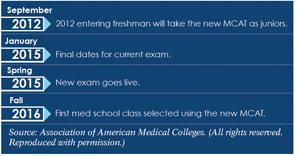Many pre-med students already take undergrad courses in humanities, philosophy and ethics, he said, but those tend to be the students who are already “tuned in” to the importance of those areas. “If the medical schools would inform pre-medical advisors and pre-med students of just why these courses are important to physicians, rather than a strict requirement, then that would hopefully also broaden the awareness of the breadth and depth of the life of a physician and minimize the tendency toward a too-focused curriculum in college,” he said.
Explore This Issue
August 2012A Step in the Right Direction
Robert Miller, MD, executive director of the American Board of Otolaryngology and physician editor of ENT Today, said he is “skeptical” that the new test features would have much of an effect. “If you’re going to try and teach communication and cultural sensitivities and things like that, doing it in college probably is not going to be nearly as effective as doing it in medical school,” he said.
But he said the possibility that the changes might attract a wider array of applicants is appealing. “Frankly, I think sometimes there’s too much emphasis on science in college education,” he said. “I think, personally, I would rather see somebody come in, not with a science degree but with a degree in other areas. That might indicate a more balanced person and somebody who’s not just focused on the science. So that would be consistent with what they’re trying to do.”
He added, “I’m not saying this isn’t a step in the right direction, but it’s more of a baby step.”
Fred Telischi, MD, chairman of the department of otolaryngology at the University of Miami Miller School of Medicine, said that while most otolaryngologists have a sufficient human touch, today’s environment has led to a decline in face time. “There’s more tendency to use technology to make a diagnosis rather than perhaps spending a little bit more time with patients,” he said. “And as reimbursement has gone down and managed care has become more prevalent … people probably feel more pressure to see patients faster so they can get more volume into the day.”
He added that making changes to the MCAT—and exposing more undergraduates to topics beyond the hard sciences—might not make a difference to a lot of people, but it’s bound to help in some cases. “They may have an ‘aha’ moment in one of those classes that stays with them the rest of their career,” he said. “It may make incremental improvements in some, it may make a big improvement in a few individuals, and that could be a good thing for medicine in general.”

Leave a Reply